Top 8 Mental Health Apps for Android Users


According to the National Institutes of Health (NIH), approximately 57.8 million adults in the United States confront mental health challenges, underscoring the critical necessity to enhance mental health services. Anxiety disorders rank as the most prevalent mental health issue among adults in the U.S., closely followed by depression and PTSD. Fortunately, advancements in technology have paved the way for various mental health support options that are readily accessible. We have researched and compiled a list of the best free mental health apps available for Android users.
1. Best for Building Resilience – Happify
Pricing: Free with premium features
Happify is an innovative app that aims to tackle multiple mental health issues such as stress, anxiety, and mood disorders. With its cheerful and user-friendly interface, users can easily engage with a variety of tracks tailored to specific issues they wish to address.
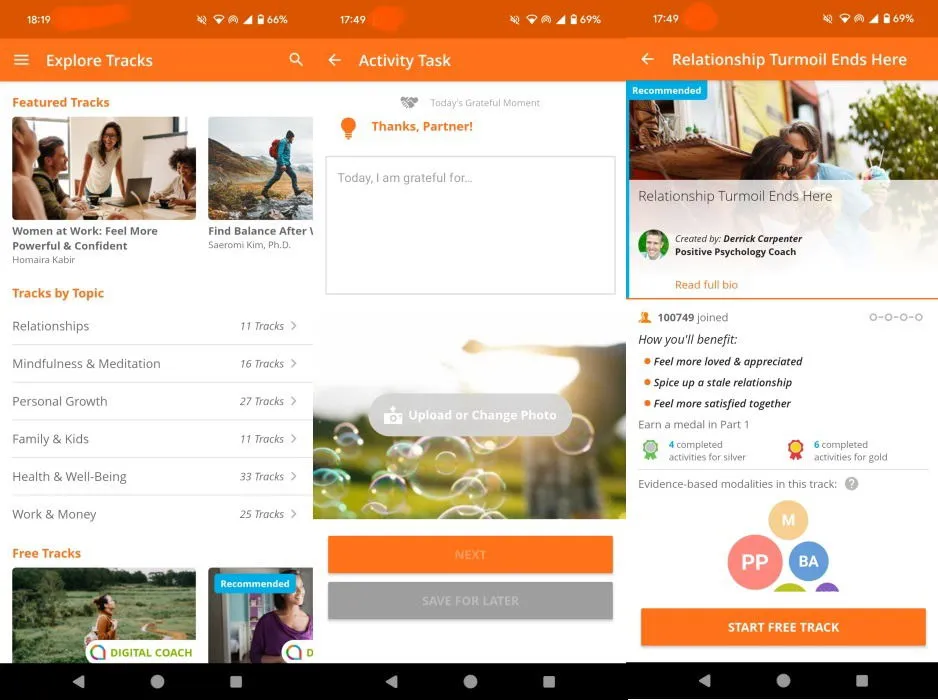
If you’re uncertain about where to begin, Happify provides an assessment test that guides you towards the most suitable tracks. Features include a Digital Coach that offers interactive support. Each track comprises tasks like journaling, mini-games, quizzes, and more—all designed to enhance resilience, uplift mood, and boost overall life contentment.
A significant advantage of Happify is that many tracks are developed with input from scientists. The app’s impressive array of experts listed on its website affirms its reliability for individuals coping with mental health conditions. Furthermore, a study published in the International Journal of Wellbeing demonstrated that users who engaged with the app at optimal levels reported reduced symptoms of depression and anxiety, as well as improved resilience over eight weeks.
2. Best for Mindfulness – Calm
Pricing: Free with premium features
Calm is one of the most popular mindfulness and meditation applications, closely rivaling Headspace. Given that Calm offers a broader range of free options, we have chosen to highlight it instead of the latter.
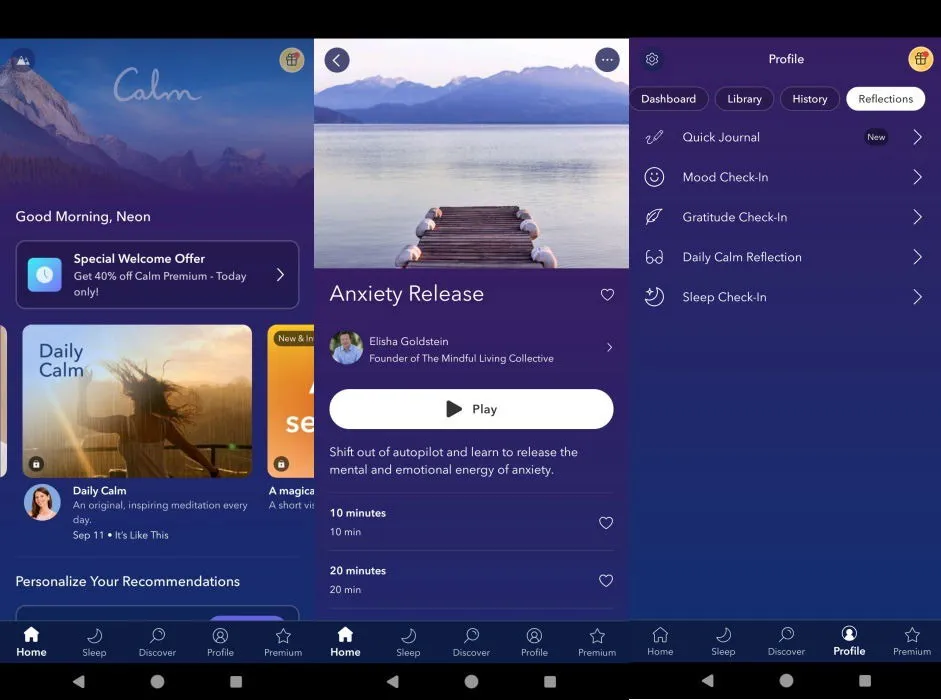
You can initiate your journey by setting goals such as enhancing self-esteem or reducing anxiety; Calm will then create a personalized meditation track just for you. In addition to guided meditations, the app also offers breathing exercises, sleep stories, and calming soundscapes. You can track your daily mood changes via the Profile page and even maintain a journal for personal reflections.
Furthermore, Calm was part of a study conducted by researchers at Arizona State University, which included 88 college students. The research concluded that the app effectively implements mindfulness meditation practices, resulting in decreased stress levels and enhanced self-compassion among the participants.
3. Best for Managing Stress – MoodMission
Pricing: Free with premium options
MoodMission is a distinct app designed for tracking your mood and assisting you in managing various stressful life situations. Backed by extensive research conducted by a team of psychologists and psychiatrists, this app offers valuable support.
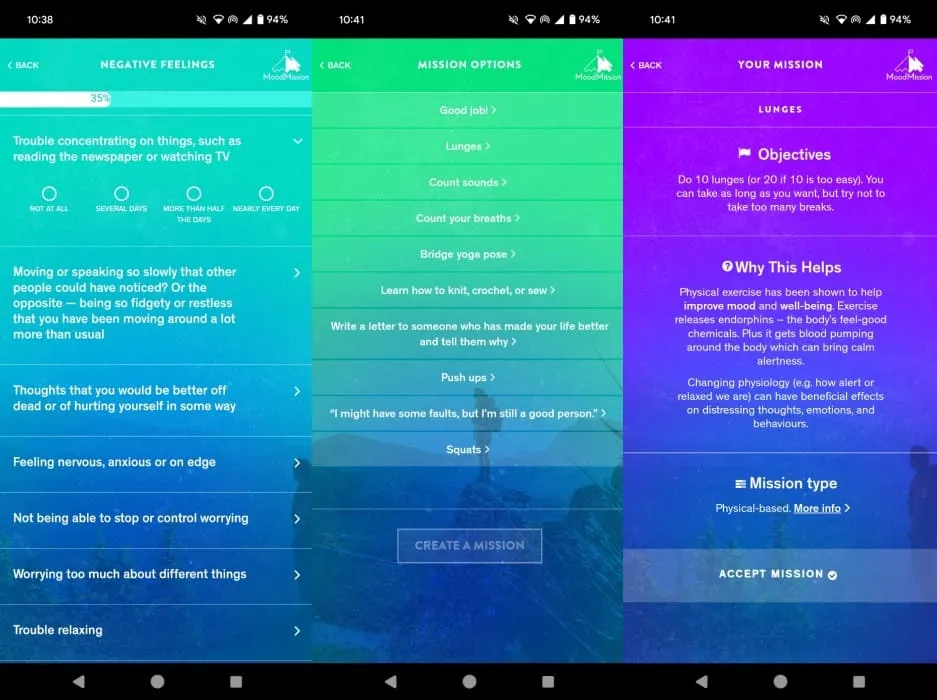
Upon completing a series of quizzes to evaluate your mental state, you can log your mood in the app. For example, if you’re feeling “low and depressed,” MoodMission will promptly suggest activities (referred to as missions) that can help uplift your mood. Each mission outlines objectives and provides a brief rationale for its potential to alleviate stress.
Numerous clinical trials have explored the effectiveness of mental health apps, including MoodMission. A study published in the Australian Psychologist Journal in 2019 found that engagement with the app positively impacted users’ mental well-being, indicating its efficacy in alleviating moderate symptoms of depression and anxiety through improved coping self-efficacy.
4. Best for Anxiety & Depression Relief – Youper
Pricing: Free with premium options
Youper employs techniques from Cognitive Behavioral Therapy (CBT) to help users enhance their mental well-being. This therapeutic approach assists individuals in modifying negative thought patterns that affect their emotions and behaviors.
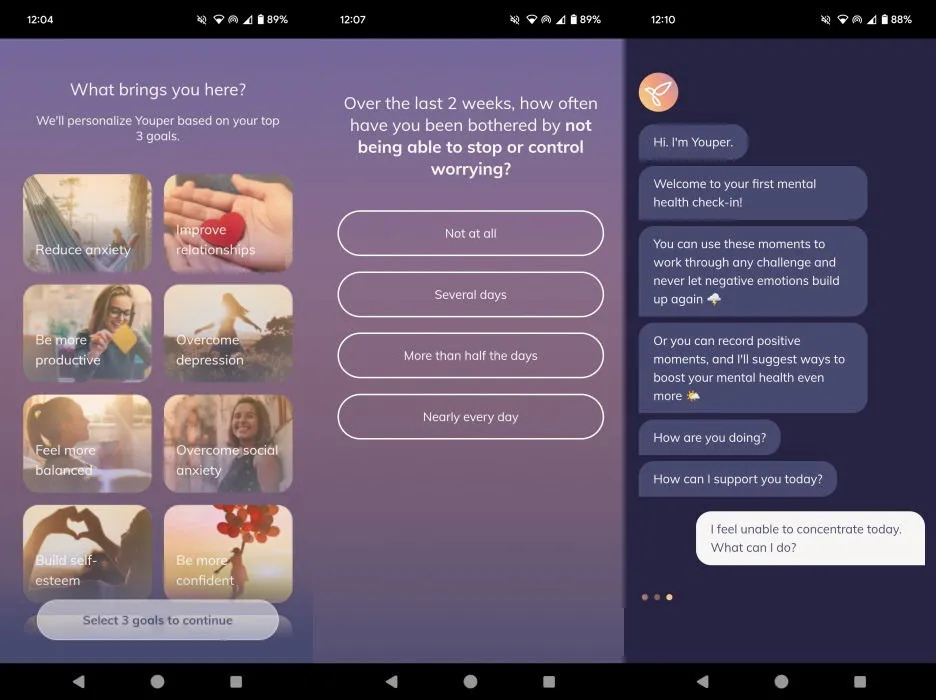
The app features a chat-based interface, allowing users to share their experiences with an AI companion. This model taps into the idea that many individuals often just need someone to converse with for relief. The assistant assesses your emotional state and provides personalized suggestions for improvement.
A notable study conducted by Stanford University highlighted Youper’s benefits for mental health, showing that users exhibited significant reductions in anxiety and depressive symptoms, validating the app’s role as a beneficial therapeutic aid.
5. Best for Self-Harm Urges – Calm Harm
Pricing: Free
Calm Harm is specifically designed for individuals managing self-harm urges while alleviating feelings of anxiety and stress. The app is based on dialectical behavioral therapy (DBT) principles, providing essential support for those with mood disorders.
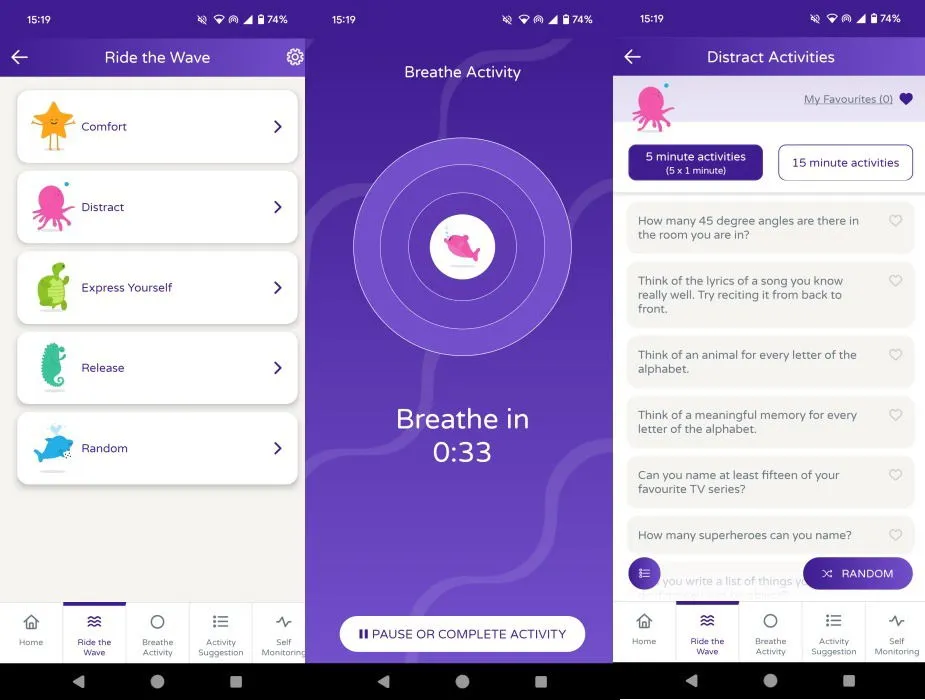
Calm Harm encourages users to “ride the wave,” meaning it offers activities spanning 5 to 15 minutes from categories like Comfort or Distraction to reduce self-harm impulses. Additionally, it features a dedicated Breathing Activity section, which provides calming exercises aimed at promoting relaxation and alleviating strong emotions.
Notably, this app is recommended by the NHS (National Health Service of Great Britain) as a valuable tool for managing self-harm thoughts.
6. Best for Online Counseling – BetterHelp
Pricing: Starting at $65 per week
If you’re feeling hesitant, pressed for time, or facing conditions that prevent you from attending in-person therapy, consider trying BetterHelp. Although it is a subscription-based service, creating an account allows you to access top-rated therapists from around the globe, with potential discounts based on your age or employment status.
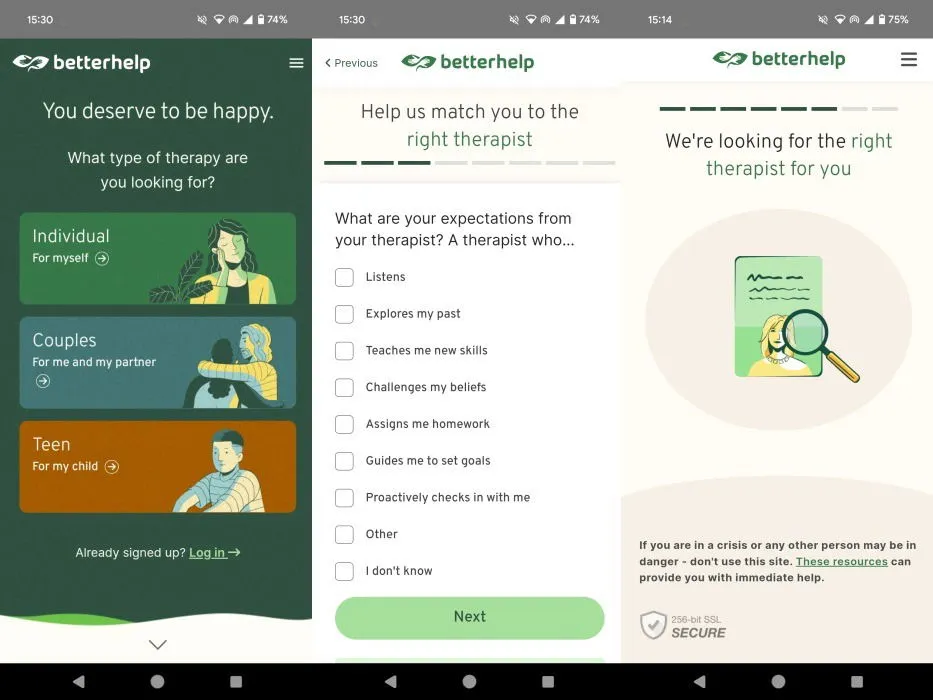
The primary advantage of BetterHelp is its ability to help you find a therapist that fits your specific needs, whether you prefer a female therapist or someone experienced in trauma-informed care. Once matched, you can connect with your therapist in a manner that feels comfortable to you, including text-only sessions, with options for phone and video chats also available.
7. Best for Focus and Sleep – Endel
A significant number of individuals dealing with mental health issues struggle with concentration and quality sleep, which can exacerbate their conditions. Endel is an innovative app that creates personalized soundscapes designed to foster relaxation and enhance focus and sleep quality.
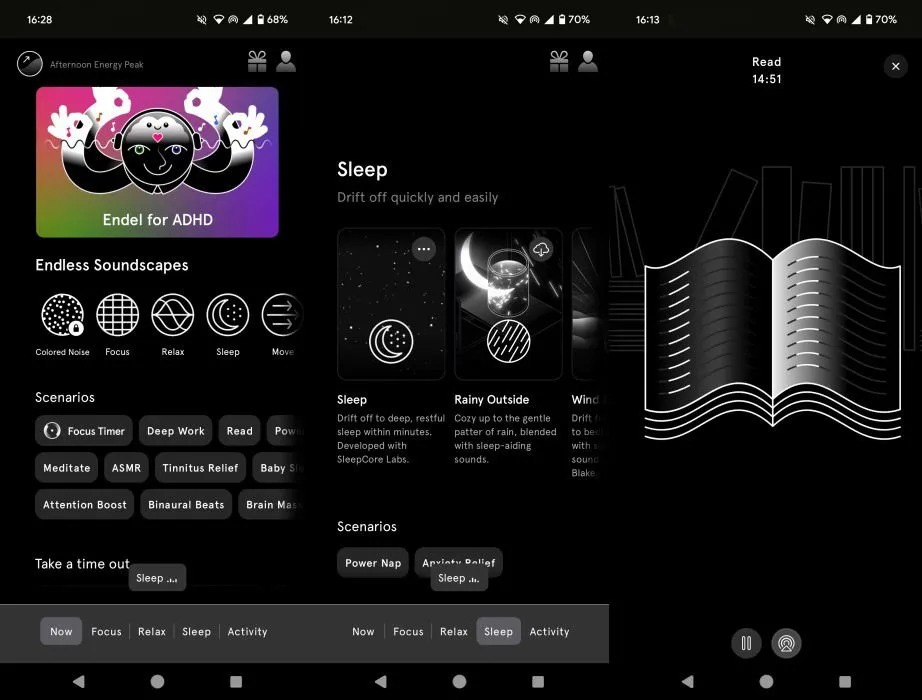
The app showcases a minimalistic interface that allows you to explore soundscapes intended to facilitate well-being. It’s not only optimized for sleep but also tailors sound environments for focus, deep work, reading, or anxiety relief.
Endel uses proprietary technology to generate real-time soundscapes. A study published in Bioarxiv investigated how personalized soundscapes influence human focus. Results indicated that the adaptive sound environments created by Endel particularly foster sustained attention, suggesting that customizable audio can enhance productivity, relaxation, and focus.
8. Best for PTSD Management – PTSD Coach
Pricing: Free
Created by the U.S. Department of Veteran Affairs (VA), PTSD Coach is a resourceful app aimed at helping individuals manage their PTSD symptoms using effective exercises, accessible to anyone regardless of their status as a veteran.
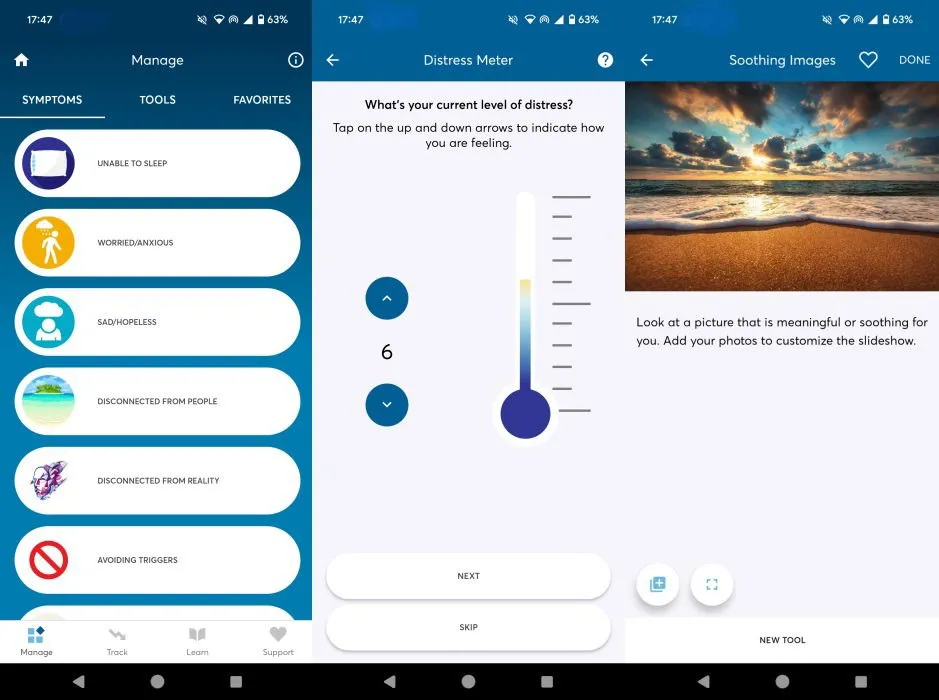
To get started, select symptoms such as “difficulty sleeping” or “feeling disconnected,” and enter your current distress level. PTSD Coach will recommend exercises fit for your situation, such as breathing techniques or visualization tasks, along with journaling functionalities.
The app also educates users about PTSD with a knowledge library containing various articles and resources. Additionally, it provides links for professional mental health assistance.
Interested in diving deeper into mental health topics? Explore these podcasts that can enhance your understanding. Also, since mental health issues can influence physical health, learn how to monitor your vital signs, including pulse and respiratory rates, using a Pixel phone.
Image credit: Pexels All screenshots by Alexandra Arici
Leave a Reply